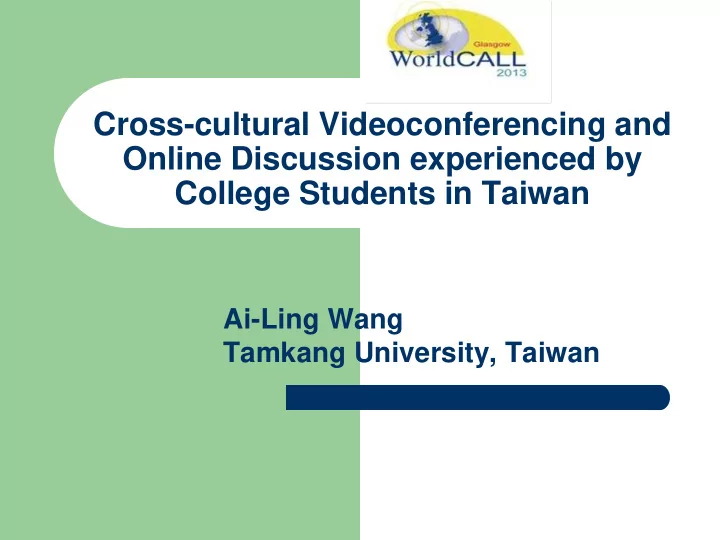

Cross-cultural Videoconferencing and Online Discussion experienced by College Students in Taiwan Ai-Ling Wang Tamkang University, Taiwan
Outline of the presentation Background of the study The research project Data collection Data analysis Findings and conclusion
Is teaching and learning a service system? In a traditional classroom, the teacher dominant the entire class. He or she decides what students have to learn. If education is considered as a service system, then a classroom should be student-centered. That is, students can decide what they want to learn and how they want to learn.
How do students value learning? In students ’ perception, what is “ learning ” and what is worth learning? What do students want to learn? How can a teacher motivate students to learn? What kinds of situation is best for students to learn?
The roles of modern technologies in teaching and learning Modern technologies can serve as catalysts of language learning mediators of different linguistic and cultural groups developers of learning communities providers of authentic information peace makers creators of multiple learning
Cross-cultural videoconferencing and online discussion A case of collaboration between Taiwanese students and American students
Participants at Tamkang University Twenty-five freshman English majors at Tamkang University, who were taking TESOL (Teaching English to Speakers of Other Languages) Methodologies as an elective course Reasons for choosing the class: 1. The nature of the course 2. The class hours
Partner Class in the U.S. The students in the partner class in the U.S. were 28 students taking TESOL methodology courses at University of Maryland. They were from different cultures.
The Taiwan-U.S. project Moodle Website Cross-cultural Videoconferencing Facebooks
Moodle Website Students were required to post their assignment, which were lesson plans, on the website and comment on each other’s lesson plan.
Cross-cultural Videoconferences Students took turns to present their lesson plans and discuss on each other’s lesson plans. Students met at videoconferences five times in the entire semester.
Videoconference room
Facebook Website It is virtual place for students to develop their partnership.
Taiwan-U.S. project survey What do you like to learn from your TKU/UMD counterparts in the cross-cultural project? What kind of tasks do you think would be beneficial for both TKU/UMD participants in the projects? Any suggestions? How did you like this experience? Do you have any EFL teaching experience? If yes, what level have you taught? If not, what level would you like to teach in the future?
Methodology The present study followed qualitative research paradigm. The researcher first collected relevant data from different sources and then followed the coding procedure of grounded theory to generate significant concepts. Finally, the author looked for patterns from the data
Data Collection Data collected for the present study included: Students’ postings on the Moodle and Facebook websites. Video-tapped cross-cultural conferences. Students’ interactions and presentations at the video- conferences. Classroom observations Interviews with the students The Taiwan-U.S. project survey.
Data Analysis A grounded-theory-based methodology: This study follows the steps typical to grounded theory: Data collection Note-takeing Coding Memoing Sorting Writing
Findings Students benefited from the cross-cultural collaboration in a variety of ways Language learning 1. Cultural learning 2. Professional learning 3. Change of power relation 4.
Language learning “I didn ’ t realize that learning English was so interesting until now … .most importantly, because of videoconferencing, learning English has become my daily routine …”
Cultural learning … I have learned from the textbook that asking American people about their age is impolite if you are not quite familiar with them … At videoconferences, I really wanted to know whether what mentioned in the textbook was right.
Professional learning “I am really interested in learning about the tangible differences between EFL and ESL, as well as the differences between English teachers whose L1 is not English versus those whose L1 is English…..”
“I am always impressed by non-native English speakers knowledge of grammatical forms and structures while most non-native English teachers I have met admire the native speaking teacher’s intuition in delivering communicative-driven activities and tasks.
Change of power relation Videoconferencing has allowed students to have their voice heard. Students feel more comfortable to express themselves while discussing a topic of their interests with their peer students. Students were seen to value an evenly distributed time to talk and the ethics of turn- taking.
The End Thank you for having me and thank you for your participation
Recommend
More recommend